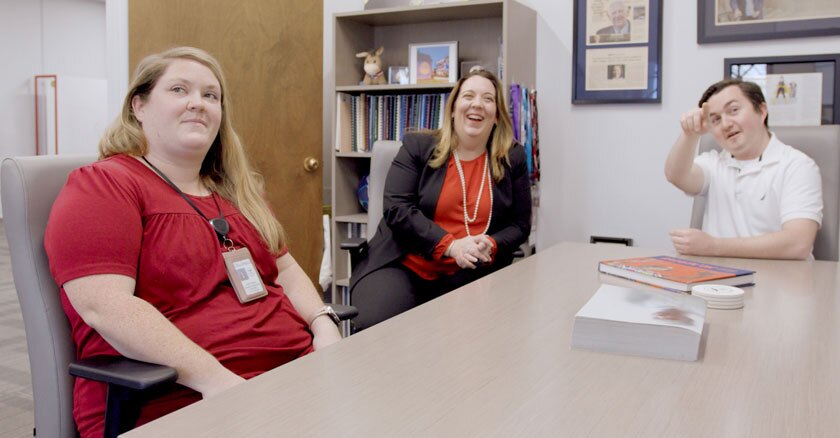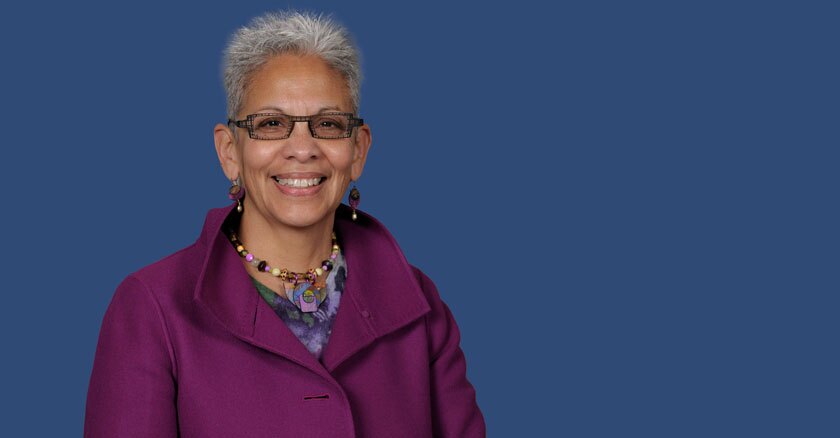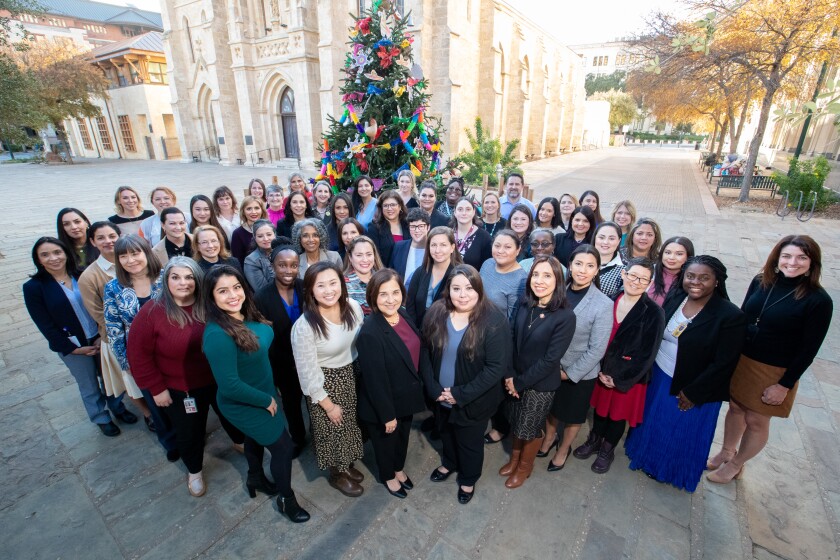Megan Kilgore met Jewell Evans when she was about 10 years old in Gallipolis, Ohio, a tiny Appalachian town on the Ohio River in the southeastern part of the state.
Megan was athletic and played boys baseball in a youth league sponsored by Jewell and her husband, Robert L. “Bob” Evans, the owners of the Bob Evans restaurant chain. Megan’s mother volunteered on a committee for the league and introduced the two.
Jewell quickly became like a “second mom,” Megan says. Her own mother was a teacher and a single parent, who, she says, “loved English” and “could absolutely copyedit the heck out of my papers.” But she didn’t have a knack for economics and finance, a burgeoning interest of Megan’s. Jewell, on the other hand, let Megan sit at her kitchen counter after school and taught her how to read the stock pages.
“I remember sitting at her counter, with her leaning over my shoulder,” she says, “and us looking at the newspaper while she told me what things meant.”
Their relationship continued throughout Megan’s teenage years. When Megan was invited to a conference for young leaders, Jewell was quick to cut a check. On Megan’s 18th birthday, Jewell gave her a collector’s coin that had “a little bit of value.”
“I remember that feeling — not even of protection or love — but just well-being, care, nurturing,” Megan says. “I’ve always wanted to emulate that same feeling that she gave to me, and that knowledge and access.”

Adobe Stock
“What Jewell taught me was the art of education, of learning, of knowledge. And that women have an incredible power. Because when women rise, we don’t just elevate ourselves, we elevate our communities,” Kilgore says.
“She broke some glass ceilings, unquestionably. But I just felt so confident to have a woman of that caliber say to me, ‘You are deserving of this. Own your knowledge, own your power, and then carry that forward and elevate others.’”
Kilgore has done just that. After a chance encounter with someone from the Ohio Attorney General’s Office, she changed plans to go away for college and enrolled instead at Ohio State, where she interned for Betty Montgomery, the first female Ohio attorney general — who became another mentor.
“I was so inspired,” Kilgore says. “She is a brilliant manager. Every day, I try to emulate her from a managerial perspective. But she also gave me a ton of access.”
That access eventually led to a job working for someone who would become yet another mentor: Hugh Dorrian, Columbus’ city auditor. He “opened his Rolodex” to her. When he retired 11 years later, Kilgore ran to replace him in 2017.
“He served for just shy of 50 years,” Kilgore says. “What he taught me was the art of service. Nobility of service. Professionalism. As great mentors do, he helped me use his doors to get access.”
Today, Kilgore is the auditor for the city of Columbus, the nation’s 14th most populous city. She’s the first woman to hold the office, as well as the first LGBTQ woman ever elected to the Columbus executive branch.
When Kilgore started her career, there weren’t a lot of women in government finance. But that has changed. According to a 2022 report by Civic Pulse, a local government research nonprofit, 68% of people holding top finance roles in local government are women. Almost every state has exceeded gender parity for top finance roles in local government. And the share of female top finance officials “significantly” surpasses the share of women top appointed officials, the report found.

Dayforce
To change that, many see mentorships as a crucial tool. Indeed, mentors have long been viewed as key to bringing more women like Kilgore into government.
Research suggests mentorship programs have significant benefits both for participants and for their organizations. One study from the Wharton School of Business found that programs lead to a 25% increase in salary for mentees and a 28% increase for mentors. Retention rates were also much higher for mentees (72%) and mentors (69%). Other studies have found that employee engagement increases and that mentees are promoted more often than those without a mentor.
Organizations with strong mentoring programs are also more likely to see a higher rate of women and minority representation in leadership roles. On average, according to the Harvard Business Review, “mentorships boost the representation of Black, Hispanic, and Asian American women, and Hispanic and Asian American men, by 9% to 24%. In industries where plenty of college-educated nonmanagers are eligible to move up, […] mentoring programs increase the ranks of white women and Black men by 10% or more.”
Pat Martel is a strong proponent of the idea that mentorship can increase the number of women in government. Martel credits her own journey — a 38-year career in local government from the Inglewood, California, public works department to a 13-year stint as city manager of Daly City — to having a strong mentor.
“My very first mentor saw something in me that I didn’t even see in myself,” she says. “He saw the potential for me to become a chief executive in a way that had never even dawned on me. And he didn’t just see that in me, he cultivated it in me and created many, many opportunities to advance my career with the benefit of his mentorship. I learned from the ground up how to do the job of a city manager.”
Since 2019, Martel has served as the West Coast regional director for the International City/County Management Association, or ICMA. She has served as a mentor in many programs and helped ICMA establish formal mentorship programs in more than 14 states.

ICMA
Martel believes “intentional” mentorship programs are key to increasing the number of women in government. She points to successes in programs such as ICMA’s CoachConnect, which offers personalized online mentoring sessions to rising professionals or seasoned managers in local government. “People need to see who they can be,” she says. “If they have never seen a woman in this capacity, they can’t envision it for themselves. I certainly never saw a female, woman-of-color city manager.”
Mentorship programs can benefit women even if the programs aren’t specifically targeted to female employees. (One reason, put forth a few decades ago by David Thomas, a former dean of the business school at Georgetown University, is that white male executives may feel uncomfortable reaching out informally to young women and minorities. Yet they are eager to mentor protégés who are assigned to them, and women and minorities are often first to sign up as mentees.)
But mentorship programs focused on women can be hard to find. Some national public sector associations — including ICMA, the National Conference of State Legislatures and the National Association of Counties, along with organizations like Engaging Local Government Leaders and the Center for American Women and Politics — have formal mentorship and networking programs for women. But such programs seem to be rare in government.
One noteworthy exception is the city of San Antonio, which in 2014 launched an innovative Women’s Leadership Mentoring Program that serves as a national model. The idea for the program grew out of discussions between San Antonio’s city manager at the time, Sheryl Sculley, and nine other women leaders in the city. Their conversations were sparked in part by the national discourse around Sheryl Sandberg’s Lean In and research about the persistent women’s leadership gap. Data at that time showed that women accounted for 60% of undergraduate and master’s degrees being awarded, and 59% of the college-educated entry-level workforce. Yet women made up only 15% of executive officers, 8% of top earners and less than 5% of Fortune 500 CEOs.
“Despite the fact that we had a female city manager, there was still improvement to be made in promoting women into leadership, to start filling the gap and building succession planning,” says Krystal Strong, deputy director of the San Antonio Human Resources Department.

City of San Antonio
Strong was working for the city when the program started. Today, she oversees it and participates as a mentor herself. The year-long program pairs mid-level female employees with women in city executive leadership for monthly one-on-one meetings and regular events with speakers, workshops and panels made up of female leaders from the community. Each cohort of mentees also completes a capstone project to apply principles and skills learned through the program that benefit the organization and community.
The program is open to about 30 mentees a year; last year the city received 150 nominations. For the past few years, the program has begun with a “speed-matching event” where mentees rotate tables with potential mentors to give an elevator pitch about what they’re looking for. They then select their top choices, and the committee matches them with those in mind. “We have found that the mentees and mentors are more engaged because they had input,” Strong says.
The program has been a marked success. More than 340 mentees have participated since the program launched a decade ago; among them, the city has seen a 65% retention rate, and 54% of participants were promoted at least once. Eight mentees are now executives. “When we started, 38% of executives were women,” Strong says. “Today, that’s 50%.”
That’s the kind of parity that leaders like Columbus’ Kilgore and ICMA’s Martel are working for.
“Unless we are intentional about change,” Martel says, “we will never get to a point where we see the profession reflect the community.”
Kilgore agrees. “For our nation to thrive, to innovate and to take care of its own, we have to keep pressing down on the gas pedal of recruitment, training and mentorship to encourage people to consider careers in government.” As a woman, she says, “I’m uniquely positioned to help put other women on a path of upward opportunity. And I think women have a little bit of a superpower right now because of our innate adaptability and resiliency — necessary traits in today’s complex landscape.”









